when, if, before, until从句
英语语法:状语从句归纳整理
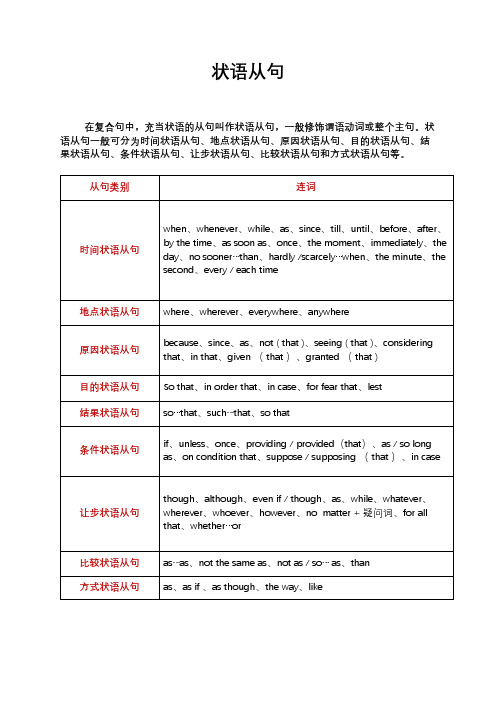
状语从句在复合句中,充当状语的从句叫作状语从句,一般修饰谓语动词或整个主句。
状语从句一般可分为时间状语从句、地点状语从句、原因状语从句、目的状语从句、结果状语从句、条件状语从句、让步状语从句、比较状语从句和方式状语从句等。
一、时间状语从句在复合句中起时间状语作用的从句称为时间状语从句,可放在句首、句中或句尾。
(二)until 和 till的用法1.肯定句:主句的谓语动词必须是延续性动词,主句、从句都为肯定式,意为“直到……为止”;2.否定句:主句的谓语动词必须是非延续性动词,从句为肯定式,表示“某动作直到某时才开始”;3.till 不可以置于句首,而until可以。
例:They waited till / until I returned.他们一直在等我回来。
You may stay here until / till the rain stops.你可以待在这里直到雨停。
He won’t go to bed until / till she returns.直到她回来,他才上床睡觉。
Until you told me I had no idea of it.直到你告诉我,我才知道这件事。
(三)since的用法(四)before的用法一般情况下before表示“在……之前”,有时根据上下文,还可表示“还未……就……” “不到……就……” “……才……” “趁……还未……”等例:Please write it down before you forget it.趁你还没忘,请把它记下来。
I must finish this letter before I go home.我必须在回家之前完成这封信。
Before I could get in a word, he had measured me.我还没来得及插话,他就给我量好了尺寸。
We had sailed four days and four nights before we saw land.我们航行了四天四夜才看到陆地。
状语从句(9种

1.时间状语从句常用引导词:when, as, while, as soon as, before, after, since , till, until特殊引导词:the minute, the moment, the second, every time, the day,the instant, immediately , directly, no sooner … than, hardly …when, scarcely … whenI didn’t realize how special my mother was until I became an adult.While John was watching TV, his wife was cooking.The children ran away from the orchard(果园), the moment they saw the guard.No sooner had I arrived home ,then it began to rain.Every time I listen to your advice, I get into trouble.2.地点状语从句常用引导词:where特殊引导词:wherever, anywhere, everywhereGenerally, air will be heavily polluted where there are factories.Wherever you go, you should work hard.地点状语从句§4地点状语从句 (adverbial clause of place) 地点状语从句一般由连接副词where, wherever等引导,已经形成了固定的句型,例如:句型1:Where+地点从句,(there)+主句。
【注意】此句型通常译成“哪里……哪里就……”;主句在从句后面时,there可用可不用;如果主句在从句的前面时,一般都不用there。
状语从句

7.比较状语从句 由than、as…as引导。如: Jim is taller than me. 吉姆比我高。 Lucy jumps as far as Lily. 露茜和莉莉跳得一样远。 8.方式状语从句 由as、as if等引导。如: Please do as I do. 请像我这样做。 She lay down as if she was ill. 她躺着似乎是病了。 9.让步状语从句。 通常由though、although、even if、Whatever等 引导。如: There is air around us, though we can't see it. 我们周围都是空气,尽管我们看不到。
Байду номын сангаас
(改错)
《中考指导》
中考考点2: if表 “是否”引导宾语从句可用将来时. C 考题:I don’t know if he __. If he __ , I’ll tell you. A. will come, will come B. comes, will come C. will come, comes D. comes, come 《中考指导》 中考考点3: “祈使句 + and (or)+ 陈述句” 在意思上相 当 于一个带有条件状语从句的复合句。
中考考点3:※※※while从句用进行时 were readinng e.g.1) My parents _______________ (read) some newspapers while I ____________ (play) with my e-dog this was playing time yesterday.《中考指导》 2) While we ____________ (travel) in were travelling Australia last year, I visited Lucy who once taught English in our school. (上海市2004)
完整版)时间状语从句
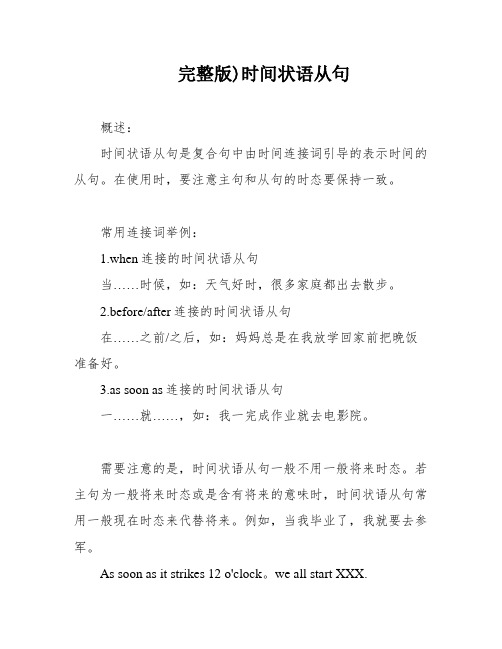
完整版)时间状语从句概述:时间状语从句是复合句中由时间连接词引导的表示时间的从句。
在使用时,要注意主句和从句的时态要保持一致。
常用连接词举例:1.when连接的时间状语从句当……时候,如:天气好时,很多家庭都出去散步。
2.before/after连接的时间状语从句在……之前/之后,如:妈妈总是在我放学回家前把晚饭准备好。
3.as soon as连接的时间状语从句一……就……,如:我一完成作业就去电影院。
需要注意的是,时间状语从句一般不用一般将来时态。
若主句为一般将来时态或是含有将来的意味时,时间状语从句常用一般现在时态来代替将来。
例如,当我毕业了,我就要去参军。
As soon as it strikes 12 o'clock。
we all start XXX.Upon our arrival。
XXX.4.时间状语从句中使用until表示一个动作一直持续到某一时刻,例如:He waited until all the people left。
我们也可以说I didn't go to bed until Mum came back。
表示直到妈妈回家后我才上床睡觉。
5.当while连接时间状语时,表示主句的行为在从句行为过程之中发生。
从句中要使用持续性动词或状态动词,并且持续性动词通常使用进行时态。
例如:While they were waitingfor the New Year。
they listened to music。
sang songs and had fun.Till and until are used to introduce time clauses in affirmative sentences。
with the main clause verb being a continuous n or state that lasts until the time XXX: XXX。
高考英语语法必考考点(12)状语从句(含解析)
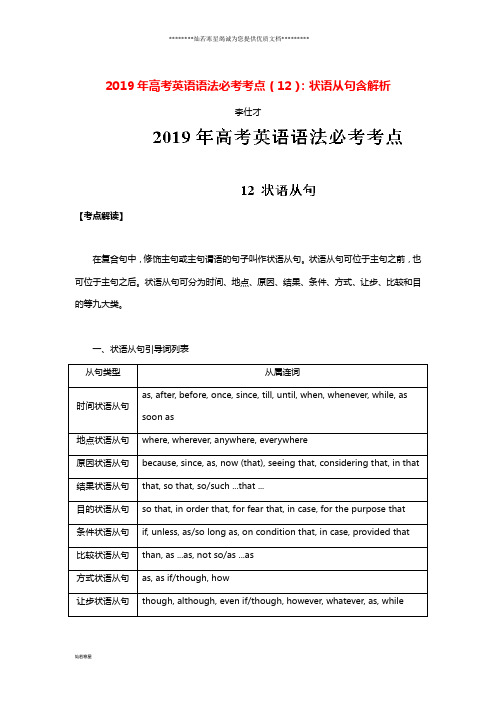
2019年高考英语语法必考考点(12):状语从句含解析李仕才【考点解读】在复合句中,修饰主句或主句谓语的句子叫作状语从句。
状语从句可位于主句之前,也可位于主句之后。
状语从句可分为时间、地点、原因、结果、条件、方式、让步、比较和目的等九大类。
一、状语从句引导词列表从句类型从属连词时间状语从句as, after, before, once, since, till, until, when, whenever, while, as soon as地点状语从句where, wherever, anywhere, everywhere原因状语从句because, since, as, now (that), seeing that, considering that, in that 结果状语从句that, so that, so/such ...that ...目的状语从句so that, in order that, for fear that, in case, for the purpose that条件状语从句if, unless, as/so long as, on condition that, in case, provided that 比较状语从句than, as ...as, not so/as ...as方式状语从句as, as if/though, how让步状语从句though, although, even if/though, however, whatever, as, while【点睛】(1)上述有些连词除了能引导状语从句外,还可引导定语从句和名词性从句。
在使用的时候,要根据句子结构和句意来判别和区分不同的从句,正确使用引导词。
以where为例,试比较下列多种从句的区别。
You are to find it where you left it. (地点状语从句)Tell me the address where he lives. (定语从句,先行词为the address)I don’t know where he came from. (宾语从句)Where he has gone is not known yet. (主语从句)This place is where they once hid. (表语从句)(2)在两个分句间要有一个且只有一个连词,千万不能按汉语习惯。
各种从句的连接词
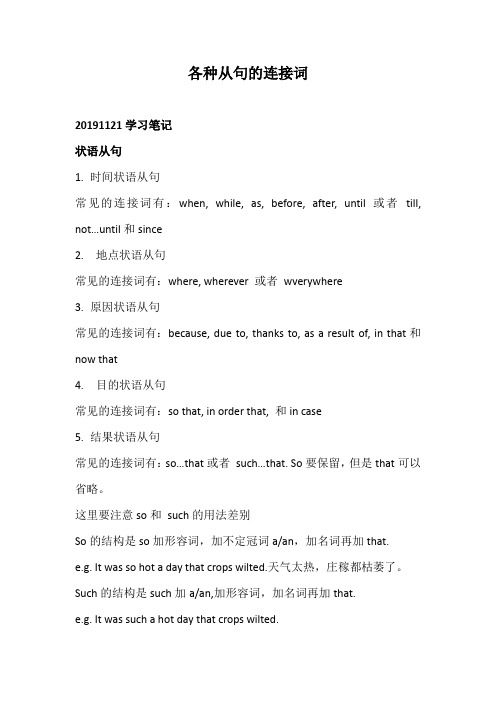
各种从句的连接词20191121学习笔记状语从句1.时间状语从句常见的连接词有:when, while, as, before, after, until 或者till, not…until和since2.地点状语从句常见的连接词有:where, wherever 或者wverywhere3.原因状语从句常见的连接词有:because, due to, thanks to, as a result of, in that和now that4.目的状语从句常见的连接词有:so that, in order that, 和in case5.结果状语从句常见的连接词有:so…that或者such…that. So要保留,但是that可以省略。
这里要注意so和such的用法差别So的结构是so加形容词,加不定冠词a/an,加名词再加that.e.g. It was so hot a day that crops wilted.天气太热,庄稼都枯萎了。
Such的结构是such加a/an,加形容词,加名词再加that.e.g. It was such a hot day that crops wilted.注意了吗:so hot a day和such a hot day6.条件状语从句常见的连接词有:if, unless, as long as, 和on condition that7.让步状语从句常见的连接词有:though, although, even if, even though和as.注:as引导让步状语从句时,在表示“虽然”的时候,句子要用倒装结构。
e.g. Hard as she works, she makes very little progress.虽然她很努力,但是没怎么进步。
8.比较状语从句除了常见的as和than,比较状语从句还有其他特殊的引导词,比如the more…the more…和no more…than9.方式状语从句常见的连接词有:as if, as though和in the way that或者the waye.g. He looks as if he is angry.他看起来好像生气了。
时间状语从句的用法

时间状语从句及用法一、普通类从属连词引导时间状语从句的普通类从属连词有when(当……时),while (在……期间),as(当……,一边……一边……),before(在……之 前),after(在……之后),since(从……以来),till/until(直到),whenever (无论何时),as soon as(一……就)等。
如:When I went into the classroom, he was reading. 当我走进教室时,他正在看书。
He read a newspaper as he went along. 他边走边看报纸。
We must strike while the iron is hot. 我们必须趁热打铁。
I will tell you after they leave. 于他们走后我再告诉你。
I told him to come back whenever he wants to. 我告诉他什么时候想回来就回来。
I waited till/until she was back. 我一直等到她回来。
Once time is gone, you will never get it back. 时间一旦失去就再也得不到了注意:在时间状语从句中,不能用一般将来时、过去将来时态或将来完成时,而要用相应的一般现在时态、一般过去时或现在完成时来代替。
如:I’ll telephone you as soon as I get there. 我一到达那里就打电话给你。
She said she would phone me as soon as she got there. 她说她一到达那里就给我电话。
Don’t get off the bus until it has stopped. 等车停稳后才下车。
二、含 time的短语可引导时间状语从句的time短语有every time, each time, (the) next time, (the) last time, by the time, the first time, any time等。
英语八类状语从句的用法归纳

英语八类状语从句的用法归纳一、概说状语从句即指在主从复合句用作状语的从句。
按照其意义,状语从句可分为时间状语从句、地点状语从句、原因状语从句、目的状语从句、结果状语从句、条件状语从句、让步状语从句等。
状语从句是高中英语学习中的一个语法重点,也是历年高考重点考查的内容之一。
学习状语从句主要应注意引导状语从句的从属连词的用法与区别,以及从属连词在一定的语言环境中的意义与用法。
二、时间状语从句1.引导时间状语从句的从属连词很多,常见的有before, after, when, while, as, since, till, until, as soon as 等。
2.表示“当…时候”的while, when, as 的用法区别是:while从句中的谓语动词必须是延续性动词;表示带有规律性的“每当”或当主、从句谓语动词的动作发生有先后时,只能用when;当表示“一边…一边…”或“随着”时,只能用as。
另外,用于此义的as 所引导的时间状语从句谓语只能是动作动词,不能是状态动词。
如下面一道高考题的答案是B 而不能是A:“I’m going to the post office.” “_____ you’re there, can you get me some stamps?”A. AsB. WhileC. BecauseD. If3.until 在肯定句中通常只连用延续性动词,表示相应动作结束的时间;在否定句中通常连用非延续性动词,表示相应动作开始的时间,意为“直到…才”。
如:He waited until she was about to leave. 他等着一直到她准备离开。
I did not begin to work till he had gone. 他走了后我才开始工作。
4.表示“一…就”除用as soon as 外,还可用the minute, the second, the instant, immediately, directly, i nstantly, no sooner…t han, hardly…w hen 等。
9大状语从句的引导词

九大状语从句的引导词时间状语从句:when(当…..时候), while(当….时候) ,as(当..时候,一边), after(在….之后), before(在…..之前), since(自从), ever since(自从)till/until(直到),not….until(直到..才),as soon as(一...就),whenever(不管什么时候),every time(每次),each time(每次)next time(下次),the first time(第一次)any time(任何) the moment(一...就...)by the time(到...), directly(一..就...), immediately(一...就..), instantly(一...就..), as long as(长达), hardly/scarcely… when….(一..就..)once(一..就..)no sooner… than….(一...就..)地点状语从句: where, wherever=no matter where(无论哪里)原因状语从句:because(因为), as(因为), since(自..以来), for(因为),for the reason that(因为),considering that, due to the fact that, owing to the fact that, in that(因为), seeing that(因为),considering that/since (既然)等条件状语从句: if(如果), unless(除非), as(so) long as(只要),in case(万一) on condition that(条件是) supposing(假设),provided that(如果) ,as far as /so far as(就…而言),even though, even if (即使), providing(that),方式状语从句:as(正如), just as(就好像,正如), as if(好像), as though(好像)让步状语从句: although(尽管), though(尽管), even if(即使), even though(即使), as, whether…or….(无论....),no matter what /when/how(无论什么,何时,怎样),now that(既然), despite(尽管),in spite of目的状语从句:that, so that(如此...以此于), in order that(为了), lest(唯恐)in case(唯恐),结果状语从句: so that, so….that, such…that(如此…….以至于)比较状语从句:as….as(和...一样), not so…..as(not as…..as)(不如...), more…than(多于)less….than, the+比较级…. ,The+比较级…..1994-2008高考英语真题状语从句总汇1. — How long has this bookshop been in business? ____________ 1982. ( 94 )A. AfterB. InC. FromD. Since2. Mother was worried because little Alice was ill, especially ______Father was away in France. ( 94 )A. asB. thatC. duringD. if3. If we work with a strong will, we can overcome any difficulty, __________ great it is. ( 95 )A. whatB. howC. howeverD. whatever4. After the war, a new school building was put up _____________ there had once been a theatre. ( 97 )A. thatB. whereC. whichD. when5. — I am going to the post office. _______you’re there, can you get me some stamps? ( 99 )A. AsB. WhileC. BecauseD. If6. You should make it a rule to leave things _____________ you can find them again. ( 99 )A. whenB. whereC. thenD. there7. ____________ you’ve got the chance, you might as well make full use of it. ( 99 )A. Now thatB. AfterC. AlthoughD. As soon as8. We’ll have to finish the job, _____________. ( 99 )A. long it takes howeverB. it takes however longC. long however it takesD. however long it takes9. Someone called me up in the middle of the night, but they hung up ____________ I could answer the phone. ( 00 ) A. as B. since C. until D. before10. The WTO cannot live up to its name _____________ it does not include a country that is home to onefifth of mankind. ( 00 )A. as long asB. whileC. ifD. even though11. The men will have to wait all day ____________ the doctor works faster. ( 01春季)A. ifB. unlessC. whetherD. that12. — Did you remember to give Mary the money you owed her? — Yes, I gave it to her _____ I saw her.( 01春季)A. whileB. the momentC. suddenlyD. once13. Americans eat _____________ vegetables per person today as they did in 1910. (02上海春季)A. more than twiceB. as twice as manyC. twice as many asD. more than twice as many14. — How far apart do they live? _____I know, they live in the same neighbourhood. ( 03上海)A. As long asB. As well asC. As far asD. As often as15. A good storyteller must be able to hold his listeners’ curiosity ______ he reaches the end of the story.A. whenB. unlessC. afterD. until ( 03上海)16. Generally speaking, ____________ according to the directions, the drug has no side effect. ( 03上海)A. when takingB. when takenC. when to takeD. when to be taken17. —Dad, I’ve finished my assignment.—Good, and _____ you play or watch TV, you mustn’t disturb me. ( 03上海)A. wheneverB. whetherC. whateverD. no matter18. — Was his father very strict with him when he was at school?— Yes. He has never praised him _______ he became one of the top students in his grade. (03 北京春季)A. afterB. unlessC. untilD. when19. He made a mistake, but then he corrected the situation ____________ it got worse. (03 北京)A. untilB. whenC. beforeD. as20. _____________ I know the money is safe, I shall not worry about it. (03 北京)A. Even thoughB. UnlessC. WhileD. As long as21. Scientists say it may be five or six years ________ it is possible to test this medicine on human patients.A. sinceB. afterC. beforeD. when ( 04 福建)22. You should try to get a good night’s sleep __________ much work you have to do . ( 04 湖北)A. howeverB. no matterC. althoughD. whatever23. It was evening ________ we reached the little town of Winchester .A. thatB. untilC. sinceD. before24. _____ modeling business is by no means easy to get into, the good model will always be in demand.A. WhileB. SinceC. AsD. If( 04 浙江)25. We were swimming in the lake _______ suddenly the storm started. ( 04 北京春季)A. whenB. whileC. untilD. before26. _______ I can see, there is only one possible way to keep away from the danger. ( 04 北京春季)A. As long asB. As far asC. Just asD. Even if27. We were told that we should follow the main road ________ we reached the central railway station .( 04 辽宁) A. whenever B. until C. while D. wherever28. _____ you call me to say you' re not coming, I'll see you at the theatre. ( 04 四川)A. ThoughB. WhetherC. UntilD. Unless29. You can eat food free in my restaurant ________ you like. ( 04 重庆)A. wheneverB. whereverC. whateverD. however30. _____________ I accept that he is not perfect, I do actually like the person. ( 04 江苏)A. WhileB. SinceC. BeforeD. Unless31. Several weeks had gone by ______I realized the painting, was missing. ( 04 )A. asB. beforeC. sinceD. when32. Jasmine was holidaying with her family in a wildlife park _____ she was bitten on the leg by al lion.( 04 上海) A. when B. while C. since D. once33. ________, I have to put it away and focus my attention on study this week. ( 04上海春季)A. However the story is amusing B No matter amusing the story isC. However amusing the story isD. No matter how the story is amusing34. It is almost five years we saw each other last time.A. beforeB. sinceC. afterD. when35. What a table ! I’ve never seen such a thing before .It is it is long. ( 05 湖北)A. half not as wide asB. wide not as half asC. not half as wide asD. as wide as not half36. Simon thought his computer was broken his little brother pointed out that he had forgotten to turn it on. ( 05 北京春季) A. until B. unless C. after D. because37. I’d like to arrive 20 minutes early _______ I can have time for a cup of tea. ( 05 北京)A. as soon asB. as a resultC. in caseD. so that38. It wasn’t until nearly a month later I received the manager’s reply. ( 05河南、河北)A. sinceB. whenC. asD. that39. Unlike watching TV, reading is a highly active process (过程)________ it requires attention as well asmemory and imagination. (05 江苏)A. untilB. butC. unlessD. for40. The old tower must be saved, _____________ the cost. ( 05 浙江)A. howeverB. whateverC. whicheverD. wherever41. You must keep on working in the evening ______ you are sure you can finish the task in time. ( 05 安徽)A. asB. ifC. whenD. unless42. That was really a splendid evening. It' s years _______ I enjoyed myself so much. ( 05 安徽)A. whenB. thatC. beforeD. since43. John is the tallest boy in the class, ___________ according to himself. ( 05 安徽)A. five foot eight as tall asB. as tall as five foot eightC. as five foot eight tall asD. as tall five foot eight as44. —Did Jack come back early last night?—Yes. I t was not yet eight o’clock he arrived home. ( 05 福建)A. beforeB. whenC. thatD. until45. Allow children the space to voice their opinions, __________ they are different from your own. ( 05 湖南) A. until B. even if C. unless D. as though46. The more I think about him, the more reasons I find for loving him ___ I did. ( 05 湖南)A. as much asB. as long asC. as soon asD. as far as47. you’ve tried it. you can’t imagine how pleasant it is. (06北京)A. UnlessB. BecauseC. AlthoughD. When48. --- How long do you think it will be _________ China sends a manned spaceship to the moon?--- Perhaps two or three years. (06福建)A. whenB. untilC. thatD. before49. Jenny was very sad over the loss of the photos she had shot at Canada, this was a memory she especially treasured. (06广东)A. asB. ifC. whenD. where50. "You can't have this football back you promise not to kick it at my cat again," the old man said firmly. (06广东) A. because B. since C. when D. until51. I had just stepped out of the bathroom and was busily drying myself with a towel ____ I heard the steps. (06湖南) A. while B. when C. since D. after52. _________ environmental damage is done, it takes many years for the ecosystem (生态系统) to recover. (06江苏) A. Even if B. If only C. While D. Once53. He was about halfway through his meal a familiar voice came to his ears. (06辽宁)A. whyB. whereC. whenD. while54. he has limited technical knowledge, the old worker has a lot of experience. (06全国I )A. SinceB. UnlessC. AsD. Although55. We’re just trying to teach a point ____ both sides will sit down together and talk. (06 山东)A. whereB. thatC. whenD. which56. How can you expect to learn anything ____ you never listen? (06山东)A. in caseB. even ifC. unlessD. when57. His plan was such a good one _________we all agreed to accept it. (06 陕西)A. soB. andC. thatD. as58. This is a very interesting book. I’ll buy it, __________. (06 陕西)A. how much may it costB. no matter how it may costC. however much it may costD. how may it cost59. My parents were quarrelling about me ____ I could not quite tell why. (06上海)A. sinceB. thoughC. ifD. until60. --- Mom, what did your doctor say? --- He advised me to live the air is fresher. (06四川)A. in whereB. in whichC. the place whereD. where61. --- Why didn’t you tell him about the meeting?--- He rushed out of the room I could say a word. (06四川)A. beforeB. untilC. whenD. after62. The cost of living in Glasgow is among the lowest in Britain, the quality of life is probably one of thehighest. (06天津) A. since B. when C. as D. while63. If you are traveling the customs are really foreign to your own, please do as the Romans do. (06天津) A. in which B. what C. when D. where64. In time of serious accidents,_________ we know some basic things about first aid, we can save lives.(06重庆) A. whether B. until C. if D. unless65. ____ most of the earth’s surface is covered by water, fresh water is very rare and precious. (06上海春季)A. AsB. OnceC. IfD. Although66 .He was told that it would be at least three more months he could recover and return work. 2007江西A. whenB. beforeC. sinceD. that67. The field research will take Joan and Paul about five months; it will be a long time _____ we meet themagain.2007安徽 A. after B. before C. since D. when68 In my opinion, life in the twenty-first century is much easier than ________.2007安徽A. that used to beB. it is used toC. it was used toD. it used to be69. Most birds find it safe to sleep in the trees, but ________ they have eggs or young chicks, they don’t use a nest.2007湖南 A. why B. how C. unless D. where70. Pop music is such an important part of society ______ it has even influenced our language. 2007上海A. asB. thatC. whichD. where71. Many of them turned a deaf ear to his advice, _______ they knew it to be valuable 2007浙江.A. as ifB. now thatC. even thoughD. so that72. My parents live in a small village. They always keep candles in the house _____ there is a power out.A. ifB. unlessC. in caseD. so that 2007重庆73. I won’t call you, ________ something unexpected happens. 2007 海南A. unlessB. whetherC. becauseD. while74.________I really don’t like art, I find his work impressive. 2007山东A.As B.Since C.If D.While75. Leave your key with a neighbor ___ you lock yourself out one day2007北京A. ever sinceB. even ifC. soon afterD. in case76. We had to wait half an hour ______ we had already booked a table (2007辽宁.)A. sinceB. althoughC. untilD. before77. Small sailboats can easily turn over in the water ______ they are not managed carefully.A. thoughB. beforeC. untilD. if 2007上海78. Having checked the doors were closed , and _________ all the lights were off, the boy opened the door to hisbedroom. 2007湖南A. whyB. thatC. whenD. where79.---Where’s that report?---I brought it to you ____you were in Mr. Black’s office yesterday. 2007北京A. ifB. whenC. becauseD. before80___ he had not hurt his leg, John would have won the race. 2007 国2A. IfB. SinceC. ThoughD. When81. All people, they are old or young, rich or poor, have been trying their best to help those in need sincethe disaster. (2008重庆)A. even ifB. whetherC. no matterD. however82. You'd better not leave the medicine ______ kids can get at it. (2008山东)A. even ifB. whichC. whereD. so that83. I used to love that film ______ I was a child, but I don't feel it that way any more. (2008辽宁卷)A. onceB. whenC. sinceD. although84. Later in this chapter cases will be introduced to readers __ consumer complaints have resulted in changes inthe law. (2008江西卷) A. where B. when C. who D. which85. -----Have you got any particular plans for the coming holiday?----- Yes, _______, I’m going to visit some homes for the old in the city. (2008安徽卷)A. If everB. If busyC. If anythingD. If possible。
状语从句用法总结

状语从句用法总结状语从句是指在复合句中充当状语的从句。
它可以修饰谓语动词、形容词、副词、介词等,为主句表达更加准确、丰富和生动的意义。
下面是状语从句的用法总结。
1. 时间状语从句时间状语从句表示时间的划分、顺序或先后关系,一般由when, while, as, before, after, since, till, until, as soon as, the moment等引导。
例如:She had breakfast before she went to work. (她上班之前吃了早饭。
)地点状语从句表示事情发生的地点,一般由where, wherever等引导。
例如:I will go wherever you go. (无论你去哪里,我都会跟着你去。
)原因状语从句表示主句发生的原因,一般由because, since, as, for等引导。
例如:I took an umbrella with me so that I wouldn't get wet. (我带了一把伞,以免淋湿。
)比较状语从句表示主句和从句中两个被比较的事物之间的关系,一般由as...as,than等引导。
例如:She is as tall as her sister. (她和她姐姐一样高。
)方式状语从句表示主句中的动作或状态如何进行或实现,一般由as, the way等引导。
让步状语从句表示尽管有某种反对因素,但主语还是发生了从句中表示的动作或状态,一般由although, though, even though, despite the fact that等引导。
状语从句在句子中起着很重要的作用,能够使语言表达更丰富、更准确。
当我们对各种状语从句的用法都掌握清楚后,就可以更好地运用它们来表达自己的意思。
状语从句是英语语法中的重要组成部分,它可以让我们表达更加复杂的语义,增强我们语言表达的准确性和精度。
状语从句可以从不同的角度来划分,如时间、地点、原因、条件、结果、比较、方式、目的和让步等,下面我们逐一梳理一下。
状语从句(完整归纳)
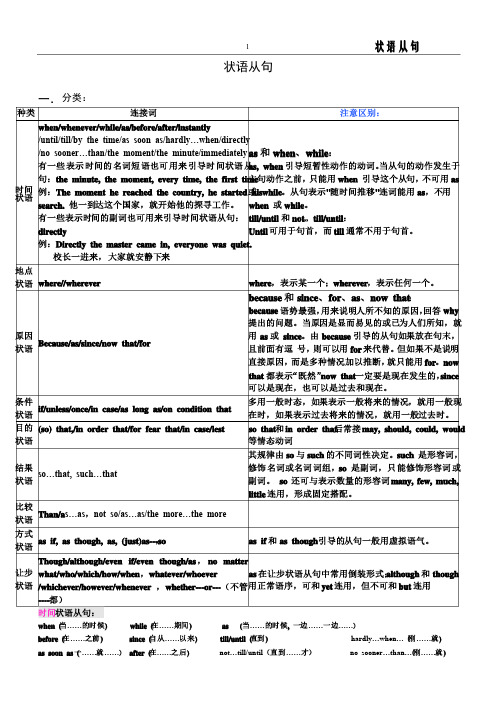
状语从句一.分类:种类连接词注意区别:时间状语when/whenever/while/as/before/after/instantly/until/till/by the time/as soon as/hardly…when/directly/no sooner…than/the moment/the minute/immediately有一些表示时间的名词短语也可用来引导时间状语从句:the minute, the moment, every time, the first time例:The moment he reached the country, he started hissearch. 他一到达这个国家,就开始他的探寻工作。
有一些表示时间的副词也可用来引导时间状语从句:directly例:Directly the master came in, everyone was quiet.校长一进来,大家就安静下来as和when、while:as, when 引导短暂性动作的动词。
当从句的动作发生于主句动作之前,只能用when 引导这个从句,不可用as或while。
从句表示"随时间推移"连词能用as,不用when 或while。
till/until和not…till/until:Until可用于句首,而till通常不用于句首。
地点状语where//wherever where,表示某一个;wherever,表示任何一个。
原因状语Because/as/since/now that/forbecause和since、for、as、now that:because语势最强,用来说明人所不知的原因,回答why提出的问题。
当原因是显而易见的或已为人们所知,就用as或since。
由because引导的从句如果放在句末,且前面有逗号,则可以用for来代替。
但如果不是说明直接原因,而是多种情况加以推断,就只能用for。
7 时间状语从句

时间状语从句:
表示的时间不同,所用连词也不同。 1.由“when” 引导的从句:表示主句的动作和 从句的动作同时发生,或从句的动作发生在主 句动作之前。 When the teacher came in, all of us stand up. When he came in ,we were playing basketball. --当王祖蓝来时,我刚要出门。 --她来时,我将告诉她这个好 消息。
I was going out when Wang Zulan came.
I shall tell her the good news when she comes.
while • ①while通常表示一段时间,从句中宜用持续 性动词作谓语。 eg. She fell asleep while she was reading the newspaper. Lucy was watching TV while Lily was doing her homework. ②while有时可以作并列连词,表示对比,可译 成……而……。 • I am fond of English while he likes maths. • •
时间状语从句
①when从句:表示主句的动作和从句的动 作同时发生,或从句的动作发生在主句 动作之前。 eg.
When I got home, my family were already having dinner.点 When they were still talking and laughing, the teacher came in.段 He waved a hello when he saw her.点 When you think you know nothing, you begin to know something.段
if条件状语从句的时态练习

if 条件状语从句的时态练习1.If 引导的条件状语从句和以when , before, after, until , as soon as 等词引导的时间状语从句一样,1. 主句用一般将来时,从句用一般现在时2. 主句用祈使句,从句用一般现在时3. 主句含情态动词,从句用一般现在时2. if 引导的条件状语从句与祈使句之间的转换If you work harder , you’ll pass the exam.= Work harder , and you’ll pass the exam.If you don’t hurry up , you’ll be late for school.=Hurry up , or you’ll be late for school .Ⅰ.单项选择(15分)1.If you _____ to the party, you’ll have a great time. A. will go B. went C. go D. going2. It will be a long time ____ Peter _____ his work.A. since, has finishedB. after, finishesC. when, will finishD. before, finishes.3. What will father _____ us from Japan?A. takeB. bringC. carryD. make4. Weifang is famous ______ kitesA. forB. toC. onD. with5.I ____ her the answer if she ____me.A. can tell, will askB. will tell, will askC. would tell, askD. will tell, asks6. – What are you going to do tomorrow?--We’ll go to the library tomorrow if it ___.A. isn’t rainB. rainC. won’t rainD. doesn’t rain7.—Do you know when he will come back tomorrow?--Sorry, I don’t know. When he ____ back, I’ll tell you.A. comesB. will comeC. comeD. may come8. What will you do if you _____ to t he old folk’s home visit?A. goB. wentC.goingD. will go9. If I eat ____ food, I’ll be very fat.A. too manyB. many tooC. too muchD. much too10. I’ll give the book to him if he ___ here next Sunday.A. will comeB. comesC. is comingD. came11. There ____an English film in our school tomorrow.A. is going to haveB. will haveC. is going to beD. has12. Could you tell us where ____?A. will the next Olympic Games heldB. the next Olympic Games will be heldC. would the next Olympic Games be heldD. the next Olympic Games would be held14.What ____ you ____ when it began to rain?A. do, doB. were, doingC. are, doingD. did, do15. I’ll wake you up when he ____back.A. willB. is going to comeC. comesD. come1---5 CDBAD 6---10 DAACB 11---15 CBCBC二、用所给词的适当形式填空1.If Bruce ________(be) free, Let’s go to the park.2. T ell him the news if you ________ (meet )him tomorrow.3. If he ________(do) well in the exam. His teacher will be pleased with him. 4.If Mary ________(leave ) home too long, she ________(miss) her parents.5. Be quick , and you _________(arrive) in time.other students’ homework.6. Hurry up, or you_________(be ) late for school.三.将下列句子改为含if条件从句的复合句1. Get enough sleep , and we won’t feel tired._______________, we won’t feel tired.2. Think hard , or you won’t find a better way..________________, you won’t find a better way.3. You are going to copy other s’ papers . The teacher won’t let you take the exam._____________________, the teacher won’t let you take the exam.III完成句子1.如果他到的晚了会发生什么事情?What _______________ if he _____________ late?2. 如果努力学习,你就会取得好成绩。
英语八类状语从句的用法归纳

一、概说状语从句即指在主从复合句用作状语的从句。
按照其意义,状语从句可分为时间状语从句、地点状语从句、原因状语从句、目的状语从句、结果状语从句、条件状语从句、让步状语从句等。
学习状语从句主要应注意引导状语从句的从属连词的用法与区别,以及从属连词在一定的语言环境中的意义与用法。
二、时间状语从句壹、普通类从属连词引导时间状语从句的普通类从属连词有when(当……时),while(在……期间),as (当……,一边……一边……),before(在……之前),after(在……之后),since(从……以来),till/until(直到),whenever(无论何时),as soon as(一……就)等。
如:When I went into the classroom, he was reading. 当我走进教室时,他正在看书。
He read a newspaper as he went along. 他边走边看报纸。
We must strike while the iron is hot. 我们必须趁热打铁。
I will tell you after they leave. 于他们走后我再告诉你。
I told him to come back whenever he wants to.我告诉他什么时候想回来就回来。
I waited till/until she was back. 我一直等到她回来。
Once time is gone, you will never get it back. 时间一旦失去就再也得不到了注意:在时间状语从句中,不能用一般将来时、过去将来时态或将来完成时,而要用相应的一般现在时态、一般过去时或现在完成时来代替。
如:I’ll telephone you as soon as I get there.我一到达那里就打电话给你。
She said she would phone me as soon as she got there.她说她一到达那里就给我电话。
2021届深圳中学新高考英语语法复习微专题if、until、before、whether用法小结辨析
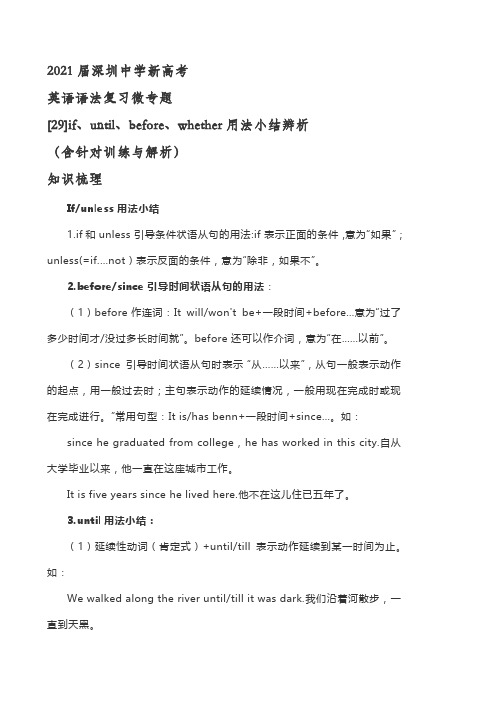
2021届深圳中学新高考英语语法复习微专题[29]if、until、before、whether用法小结辨析(含针对训练与解析)知识梳理If/unless 用法小结1.if和unless 引导条件状语从句的用法:if 表示正面的条件,意为“如果”;unless(=if.…not)表示反面的条件,意为“除非,如果不”。
2.before/since 引导时间状语从句的用法:(1)before 作连词:It will/won't be+一段时间+before...意为“过了多少时间才/没过多长时间就”。
before 还可以作介词,意为“在......以前”。
(2)since引导时间状语从句时表示“从……以来”,从句一般表示动作的起点,用一般过去时;主句表示动作的延续情况,一般用现在完成时或现在完成进行。
”常用句型:It is/has benn+一段时间+since...。
如:since he graduated from college,he has worked in this city.自从大学毕业以来,他一直在这座城市工作。
It is five years since he lived here.他不在这儿住已五年了。
3.until用法小结:(1)延续性动词(肯定式)+until/till表示动作延续到某一时间为止。
如:We walked along the river until/till it was dark.我们沿着河散步,一直到天黑。
(2)非延续性动词/延续性动词(否定式)+until/till表示“直到……才”。
如:He didn't know anything about it until/till I told him.直到我告诉他,他才知道这件事。
(3)not until 用于强调句型"It is notuntil.…that.…”。
如:I was not unlil the profesor came that we began the experiment.直到教授来了,我们才开始做实验。
语法中的条件句与时间状语从句

语法中的条件句与时间状语从句语法中的条件句和时间状语从句是两个不同的概念,在句子结构和用法上有明显的区别。
条件句用来表达一种条件和结果的关系,而时间状语从句则用来描述事件或行为发生的时间。
本文将详细介绍这两种从句的特点及其用法。
一、条件句条件句是由一个条件从句和一个结果从句组成的句子。
根据条件句的真实性和可能性,条件句可以分为四种类型:零条件句、一般条件句、虚拟条件句和混合条件句。
下面分别介绍它们的特点和用法。
1. 零条件句零条件句表示条件从句和结果从句之间的关系是普遍性的、无条件的。
在这种情况下,条件从句的谓语动词使用一般现在时,结果从句的谓语动词使用一般现在时或一般将来时。
例如:- If you heat ice, it melts.(如果你加热冰,它会融化。
)- Water boils if you heat it to 100 degrees Celsius.(如果你将水加热到100摄氏度,它会沸腾。
)2. 一般条件句一般条件句表示条件从句的发生与结果从句的发生存在一定的关联性和可能性。
在这种情况下,条件从句的谓语动词使用一般现在时,而结果从句的谓语动词使用一般现在时、一般将来时或命令句。
例如:- If it rains, I will stay at home.(如果下雨,我就会呆在家里。
)- If you don't hurry, you will miss the train.(如果你不赶快,你会错过火车。
)3. 虚拟条件句虚拟条件句表示条件从句的情况与结果从句的情况相反或不太可能发生。
在这种情况下,条件从句的谓语动词使用虚拟语气(过去式),而结果从句的谓语动词使用过去完成时。
例如:- If I were you, I would apologize to her.(如果我是你,我会向她道歉。
)- If I had studied harder, I would have passed the exam.(如果我努力学习,我就可以通过考试。
介词从句知识点

介词从句是英语语法中的重要知识点之一,它在句子中起到连接两个句子或短语的作用。
在介词从句中,一个介词引导一个从句,该从句可以作为一个名词、形容词或副词。
以下是介词从句的一些基本知识点和使用方法。
1.介词从句的结构介词从句由一个介词和一个从句组成。
从句可以是一个主语、宾语、定语、状语或补语。
2.引导介词从句的介词常见的引导介词有:after, before, until, since,when, while, because, although, if, unless等。
3.引导时间介词从句时间介词从句用来表示一个动作或事件发生的时间。
常见的引导词有:when, while, before, after, since等。
例如: - I will call you when I arrive at the station. (我到车站后会给你打电话。
) - She likes to read books while she is waiting for the bus. (她在等公车的时候喜欢读书。
)4.引导地点介词从句地点介词从句用来表示一个动作发生的地点。
常见的引导词有:where, wherever, anywhere, everywhere等。
例如: - Let’s meet at the place where we had dinner last time. (我们上次吃饭的地方见面吧。
) - He can work wherever he wants. (他可以在任何地方工作。
)5.引导原因介词从句原因介词从句用来表示一个动作或事件发生的原因。
常见的引导词有:because, as, since, for等。
例如: - I am tired because I didn’t s leep well last night. (我昨晚没睡好,所以很累。
) - She couldn’t come to the party as she had to work late. (她因为要加班所以不能参加派对。
状语从句引导词总结

状语从句引导词总结状语从句是句子中用来修饰动词、形容词、副词或整个句子的从句。
状语从句可以由多种引导词来引导,以下是一些常见的状语从句引导词:1.时间状语从句:when (当...时候)while (当...的时候)after (在...之后)before (在...之前)since (自从...以来)until/till (直到...)as soon as (一...就...)as long as (只要...)whenever (无论何时)2.原因状语从句:because (因为)since (因为)as (因为)3.结果状语从句:so that (以便)in order that (为了)4.条件状语从句:if (如果)unless (除非)provided/providing that (只要)as/so long as (只要)on condition that (只要)5.比较状语从句:as... as (像...一样)than (比...)6.目的状语从句:in order that (为了)so that (以便)7.让步状语从句:although/though (尽管)even if/even though (即使)despite/in spite of (尽管)8.方式状语从句:as (如同)as if/as though (好像)the way (方式)9.地点状语从句:where (在...的地方)10.比较状语从句:than (比...)以上是一些常见的状语从句引导词,不同类型的状语从句可以用不同的引导词来引导。
在使用状语从句时需要注意使用适当的引导词和句子结构。
- 1、下载文档前请自行甄别文档内容的完整性,平台不提供额外的编辑、内容补充、找答案等附加服务。
- 2、"仅部分预览"的文档,不可在线预览部分如存在完整性等问题,可反馈申请退款(可完整预览的文档不适用该条件!)。
- 3、如文档侵犯您的权益,请联系客服反馈,我们会尽快为您处理(人工客服工作时间:9:00-18:30)。
when if before until引导的从句由一个主句和一个或多个从句构成的句子叫复合句。
主句是复合句的主干部分,从句是修饰主句或主句的某个成分的。
从句不能单独成句,但具有主语和谓语,须由关联词引导。
根据从句在主句中充当不同的成分,可分为不同的从句,例如,主语从句、宾语从句、表语从句、同位语从句、定语从句、状语从句等。
由when, if, before, until引导的从句一、when引导的时间状语从句(1) when引导时间状语从句时,表示“当……的时候”① when既可以指时间段也可指时间点Her brother was very fat when he was a child. 她哥哥小时候很胖。
They were talking when the teacher came in.老师进来的时候,他们正在讲话。
② when从句中既可用延续性动词又可用非延续性动词You should keep your room clean and tidy when you live here.在你住在这里的时候,你应该保持你房间干净、整洁。
When he arrives, he’ll tell us about the match.他回来的时候就会告诉我们比赛的情况。
③ when从句动作既可和主句的动作同时发生又可在主句的动作之前或之后发生Mary was doing her homework when her father was reading newspapers.玛丽的爸爸在看报纸的时候她正在做作业。
I’ll call you when I get to the airport. 我一到机场就给你打电话。
二、if引导的条件状语从句条件状语从句表示主句动作发生的条件,条件有真实和非真实两种。
if引导条件状语从句时,意为“如果,假如”,表示在某种条件下,某事很可能发生。
if除了引导条件状语从句,还可引导宾语从句。
if引导的条件状语从句和宾语从句的区别:(1)if 在句中的含义不同If 在宾语从句中翻译为“是否”,相当于whetherI want to know if he is a teacher.If 在条件状语从句中翻译为“如果”I’ll go to see you if I am free next week.(2)if 在从句中的位置不同:If 引导的宾语从句放在主句之后,做宾语;而if引导的状语从句可放在主句之前也可放在主句之后,If 引导的条件状语从句放于句首时多用逗号隔开I don’t know if the train has arrived.I will go out tomorrow if it doesn’t rain.= If it doesn’t rain, I will go out tomorrow.(3)时态要求上有区别1.I want to know if there will be a sports meeting next month.If 引导的宾语从句的时态由主句及本身时态决定;2.If it rains , we’ll hold it.If 引导条件状语从句的时态为一般现在时,记住“主将从现”三、before和until引导的状语从句(1)before表示“在… 之前”,而until表示“直到…才…”,一般情况下,两者可以互用。
主句肯定表示主句动作的终止时间,主句否定强调动作的起始时间。
1. 主句为否定时,谓语动词为非延续性动词。
常见的动词有open, start, leave, go, arrive, finish, begin, stop, etc.1) The noise of the street didn’t stop before/until it was midnight.2) The children won’t come back until/before it is dark.3) I didn’t leave the lonely boy befor e/until his mother came home.2. 主句为肯定式,谓语为延续性动词。
这类动词有:stand, live, stay, talk, be, wait, etc.1). He lived with his parents until/before he graduated from school.2). I will wait before/until he comes to my help.3). I shall stay here until/before you come back.(2)下列情况下宜用before不用until.1、主句为肯定式,谓语为非延续性动词时只用before.1) He fell asleep before I could take off his clothes.2) We arrived there before it started to rain.3) The holiday came to an end before I knew it.2、主句谓语动词强调动作的迟缓性,只用before,这时常伴有时间段状语或时间段暗示。
It was quite a long time before he found the elephant.过了很长时间,他才找到大象。
We had walked a long way before we found some water.走了很长的路我们才找到水。
It was midnight before my brother came home.我哥哥直到半夜才回来。
3、如果强调从句谓语动作未发生就发生主句谓语动作,只用before,这时常译为“未及(不等)……就……”1)We can leave early in the morning before it gets too hot.趁天还不太热,我们上午早点离开。
2)I must write it down before I forget it.趁我还未忘,我必须把它记下来。
4、表示“与其说……倒不如……”,“与其……毋宁……”的意思时只用before.I would give up my job before I agree to be dismissed. 我与其被解雇还不如先辞职。
He will die of hunger before he steals.他宁愿饿死也不愿意去偷。
5.在某些特定句型中用before。
It was (not) long before…(不久)过了很长时间才…It will (not) be long before…(不到)要过很长时间才会…It will probably not be long before they understand each other.他们大概过不久就会互相了解。
It was not long before the whole country rose up.不久全国人民就奋起反抗。
(3)下列情况一般使用until1、主句是延续性谓语动词时,肯定,否定都可以,但意义完全不同,肯定表示动作终止,而否定表示动作开始。
For example:1).We discussed the problem until/before he came back. 我们一直讨论到他回来。
2).We didn’t discuss the problem until he came back. 我们一直等他回来才讨论问题。
2、Not…until…句型,尽管在某些情况下可与before互换使用,但在强调句中一般仍用until;1). It was not until he told me that I knew it.直到他告诉我我才知道这件事。
2).It was not until he finished his homework that he went home.直到完成作业他才回家。
3放于句首时用until.Until he finished his homework ,he didn’t go home. 直到完成作业他才回家。
应注意:在使用not until时,若not until放于句首,句子应部分倒装。
Not until he finished his homework,did he go home. 直到完成作业他才回家。
四、when,if,until,before引导的状语从句位置when , if和until引导的状语从句放在主句前,也可放在主句后。
但是放在主句前面时,须用逗号,隔开。
而before引导的状语从句只能放在主句后面。
I want to be a teacher when I grow up.= when I grow up,I want to be a teacher五、when,if,until, before引导的状语从句的时态用法在时间和条件状语从句里,谓语动词通常用现在时态表示将来的动作或状态。
I will write to you when I come back Guangzhou.⏹He didn’t go to bed until his father came back yesterday.⏹He won’t go to bed until his father comes back today.⏹He doesn’t go to bed un til his father comes back every day.分析试题特点及做题思路考点:考连词,考时态做题思路:正确理解句子意思--- 判断语境提供的时态特点--- 选择正确的时态一、基础题:1. When my mother returned last night, I ____ a book.A. readB. am readingC. was readingD. am going to read2. What ____ you ____ when it began to rain?A. do, doB. were, doingC. are, doingD. did, do3. I will go to the beach ________ it doesn’t rain this week.A. ifB. andC. untilD. when4. We won’t leave here _______ our teacher comes back.A. untilB. sinceC. afterD. as soon as5. You’ll be late ______ you don’t get up early tomorrow morning.A. ifB. whenC. beforeD. until6. If he ______ on time, we will go without himA. doesn’t comeB. don’t comeC. didn’t comeD. won’t come7. If you _______ him tomorrow, please ask him if he ______ to work on the farm with us.A. see ; goesB. will see; goesC. will see; will goD. see; will go8. Difficulties are nothing if we ___ not afraid of themA. willB. shallC. areD. do9. Work hard if you ___ to get a good mark.A. wantedB. wantingC. wantD. will want10. If you _____ to the party, you’ll have a great time.A. will goB. wentC. goD. going11. I’ll wake you up when he ____back.A. willB. is going to comeC. comesD. come12. If you ______ tired, you ______ to have a rest.A. feels, haveB. feel, haveC. felt, hadD. is feeling, have13. If there ____ fewer trees, there _______ more pollution.A. are, isB. will be, will beC. are, will beD. will be, are14. She went to bed _______ the TV play was over.A. untilB. whenC. andD. or15. I knew nothing about it _______ he told me.A. andB. afterC. orD. until16. If she ______ (get) up late, she _____ (not catch) the early bus.A. gets, won’t catchB. will get, doesn’t ca tchC. get, won’t catchD. get, catches17. We’re leaving for Shenzhen _______ it is fine today.A. asB. whenC. ifD. whether18. I was cooking ______ she knocked at the door.A. becauseB. untilC. beforeD. when19. It was raining heavily___ we got to Paris.A. whileB. ifC. whenD. because20 . The volleyball match will be put off if it___ .A. will rainB. rainsC. rainedD. is raining提高题:1. I had to finish the picture ________ my mother came back.A. untilB. beforeC. afterD. while2. I don’t like to be interrupted if I___ .A. speakB. will speakC. am speakingD. spoke3. He was about to go to bed ________ the doorbell rang.A. whileB. asC. beforeD. when4. Where _______ he _________ the film if he has time?A. does, seeB. do, seeC. will, seeD. are, see5. _____ they ______a match when the P.E. teacher was busy?A. Are, havingB. Do, haveC. Will, haveD. Are, have6. I haven’t heard from him _______ he left home.A. beforeB. whenC. untilD. because7. Take the medicine _______ you go to bed.A. beforeB. afterC. untilD. because8. I won’t believe it _______ I hear with my own ears.A. untilB. afterC. becauseD. when9. She likes everything to be in place ________ she starts to work.A. beforeB. afterC. untilD. because10. He always stay in bed ______ lunch time.A. beforeB. afterC. untilD. because11. I don’t like to be interrupted if I___ .A. speakB. will speakC. am speakingD. spoke12. If you ___ the book you will understand the story better.A. will be readingB. have readC. will have readD. read13. If you ___ I will go with you.A. go toB. wentC. willD. should go14. If he______ exercise, he_____healthy.A. not; willB. isn’t; won’t beC. doesn’t; will beD. doesn’t do; won’t be15. If he ___ , I ___ go swimming alone.A. doesn’t come will goB. won’t come; will goC. will come; won’t goD. is coming; don’t go难题:1. I don’t know ______ he is at home now.A. beforeB. whenC. orD. if2. It will be a long time ____ Peter _____ his work.A. since, has finishedB. after, finishesC. when, will finishD. before, finishes.3.I ____ her the answer if she ____me.A. can tell, will askB. will tell, will askC. would tell, askD. will tell, asks4. It was quiet ________ those big trucks started coming through the town.A. beforeB. afterC. untilD. unless5. It seemed only seconds ________ the boy finished washing his face.A. whenB. beforeC. afterD. even if6. It _____ long before we ____ the result of the experiment.A. will not be; will knowB. is; will knowC. will not be ; knowD. is; know7. It was not ________ he took off his eyeglasses that I recognized him.A. whenB. untilC. whileD. after8. It was evening _____we reached the little town of Winchester.A. that B . until C .since D. before9.I don't know if he___ tomorrow.If he ___ ,I'll tell you.A.will come;comes B.comes;comesC.comes;will D.is coming;is coming10. I don’t know if ___ tomorrow.A. it doesn’t rainB. the rain will stopsC. the rains won’t stopD. it won’t rain。
